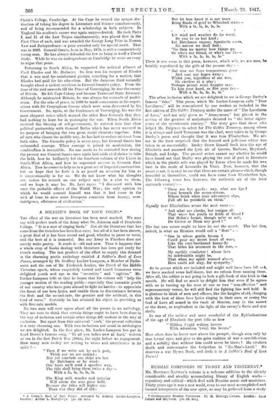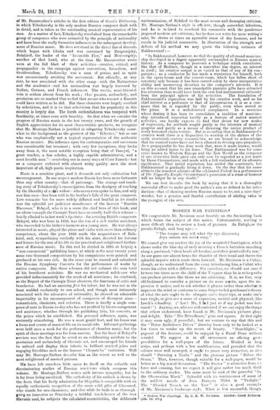RUSSIAN COMPOSERS OF TO-DAY AND YESTERDAY.*
Mn. ItIoxmou-NATIA.N's volume is a welcome addition to the already considerable and steadily accumulating library of English works— expository and critical—which deal with Russian music and musicians. Thirty years ago it was a new world, even to our most accomplished and learned interpreters of the new spirit, as may be gathered from a study *-Conlemporary Russian Composers. By M. Montagu-Nathan. London: Cecil Palmer and Hayward. 17s. Bd. neW
of Mr. Dannreuther's articles in the first edition of Grove's Dictionary, in which Tchaikovsky is the only modern Russian composer dealt with in detail, and is taken as the outstanding musical representative of his race. As a matter of fact., Tchaikovsky stood aloof from the remarkable group of composers who were animated by the principle of nationality and have been the really formative influences in the subsequent develop- ment of Russian music. He does notstand in the direct line of descent, which began with Glinka and was continued by Dargomijsky, Balakiref, the leader of the "Invincible Fire," and Moussorgsky, another of that band, who at the time Mr. Dannreuther wrote were at the full blast of their activities—creative, critical, and propagandist—in the campaign against convention, formalism, and Occidentalism. Tchaikovsky was a man of genius, and in spirit was unconsciously assisting the movement. But officially, at any rate, he was associated with the other camp —with the Rubinsteins and the academics—and his nationalism was largely leavened by Italian, German, and French influences. The exotic, semi-Oriental vein is seldom absent from his work ; Slav passion, melancholy, and pessimism are so marked that we feel that no one who was not a Russian could have written as he did. But these elements were largely overlaid by eclecticism, and it is to that eclecticism that his popularity in this country is largely due. The harsh outlandishness was tempered with familiarity, at times even with banality. So that when we consider the progress of Russian music in the last twenty years, and the growth of English appreciation for its most characteristic products, we recognize that Mr. Montagu-Nathan is justified in relegating Tchaikovsky some- what to the background as the greatest of the " Eclectics," but as one who was emphatically not a typical representative of the authentic Russian manner. His influence upon his contemporaries and successors was considerable but transient ; with very few exceptions, they broke away from it, the most notable exception being that of Taneyef, " a great teacher,. a fine scholar, a highly capable administrator, and a most lovable man "—reminding one in many ways of Cisar Franck—but as a composer endowed with almost every quality save the most important of all, high poetic inspiration.
Music is a sensitive plant, and it demands not only cultivation but encouragement. In one respect modern Russia has been more fortunate than any other country—that of patronage. Tho strange and touch- ing story of Tchaikovsky's emancipation from the drudgery of teaching by the liberality of a do's w idow:--who never even spoke to him, and only saw him once—has been told in his brother's Life of the great composer. Less romantic but far more widely diffused and fruitful in its results was the splendid yet judicious munificence of the famous " Russian Maecenas," Belayef, who is in a sense the chief hero of this book, and on whose example the Carnegie Trust have avowedly built their scheme— briefly alluded to in last week's Spectator—for assisting British composers. Belayef, who was born in 1830, was the son of a rich timber merchant., who succeeded to his father's business as a young man. He was always interested in music, played the piano and violin with more than ordinary competence, about the year 1880 made the acquaintance of Bala- kiref, and, sympathizing cordially with his aims, devoted his fortune and leisure for the rest of his life to the practical and enlightened further- ance of Russian music. To this end he started in 1835 at Leipzig a " non-commercial " publishing house, at which in the next twenty years some two thousand compositions by his compatriots were printed and produced at his own risk. In the same year he started and subsidized the Russian Symphony Concerts for the performance of works by native composers. But these schemes did not exhaust the sum total of his beneficent activities. He was no mechanical milch-cow who provided indiscriminately for the needs of all Musicians ; he combined, as the Report of the Carnegie Trust observes, the functions of critic and benefactor. He had an unerring flair for talent, but he was not in the least wedded exclusively to one school, and though most intimately associated with the advocates of nationality, he showed an admirable impartiality in his encouragement of composers of divergent aims— romanticists, classicists, and eclectics. There is hardly a single com- poser of note in Russia to-day who has- not profited by his encouragement and assistance, whether through his publishing firm, his concerts, or the prizes which he established. His personal influence, again, was eminently stimulating. He was a most genial host, and his house was a focus and centre of musical life on its social side. Informal gatherings were held once a week for the performance of chamber music, but the spirit of these meetings was far from austere. Not the least of Belayef's services was the fact that he acted as an exhilarating antidote to the pessimism and melancholy of Slavonic art., and encouraged his friends to unbend and display their talents in brilliant musical jokes and engaging frivolities such as the famous " Chopsticks" variations. Well may Mr. Montagu-Nathan describe him as the wisest as well as tho most enlightened of musical patrons.
We have left ourselves little space to dwell on the valuable and discriminating studies of Russian musicians which compose this volume. Mr Montagu-Nathan writes with intense sympathy, but he is far from being uncritical. The catholicity of his outlook is shown by the facts that his lively admiration for Skryabin is compatible with an equally enthusiastic recognition of the more solid gifts of Glazounof, who stands for neo-classicism ; and that while he hails in so thorough going an innovator as Stravinsky a faithful torch-bearer of the tree Slavonic soul, he subjects the calculated eccentricities, the deliberate antinomianism, of Rcbikof to the most severe and damaging criticism. Mr. Montagu-Nathan's style is efficient, though somewhat laborious, and he is inclined to overload his comments with the ponderous jargon of modern art criticism; but he does not write for mere writing's sake, he shows at times an agreeable sense of dry humour, and he excels in his judicial summaries. In illustration of the strength and defects of his method we may quote the following estimate of Rakhmaninof :- " In Rakhmaninof, however, we find the quality of all-round musician- ship developed in a degree apparently unexampled in Russian musical history. As a composer he possesses a technique which constitutes, like that of Medtner, though in a somewhat less degree, an interest in itself ; his creative output is as varied as that of any of his com- patriots ; as a conductor he has made a reputation for himself, both in the opera-house and the concert-room, which has fallen short of notoriety only because it has been earned solely by sheer interpretative ability and unswerving devotion to the composer's interests. It is on this account that his own remarkable pianistic gifts have attracted less attention than would have been the case had instrumental virtuosity
been the principal sphere of his activities. The foundation of Rakhmaninof s reputation was laid by his creative work, and as his chief interest, as a performer is that of interpretation it is as a com- poser that he is regarded by the public, even when seated at the piano. It is a well-deserved compliment. In a musician whose destiny it has been to consolidate a tradition of musician- ship introduced somewhat tardily as a feature of native musical activities, one hardly expects to End that desire for new anodes of expression, for methods sought partly in the interests of musical progress and partly as a means of divesting the native product of every borrowed characteristic. But in recording that in Rakhma.ninors creative work there is a disposition to worship at the shrines of the early nineteenth-century romanticists, we are bound to acknowledge that his musical tastes have not been allowed to develop into prejudices. As a propagandist he has done work that, were it made known, would bring an added lustre to his fame. That Rakhmaninof was for some years known to Western Europe and the New World as the composer of one attractive little piece can only now he regarded as a jest made by Dame Circumstance, and made with a full realization of its ultimate significance. That initial reputation has misled the continents, but Rakhmaninof is gradually living it down. On the day that his name attracts the remotest admirer of the celebrated Prelude to a performance of The Niggardly Knight, Circumstance's possession of a sense of humour will no longer be in any doubt."
We can best describe the book by saying that it is a thoroughly successful effort to make good the author's aim as defined in his intrc- duction—that of showing modern Russian music to be, not a nine days' wonder, but a genuine and fruitful contribution of abiding value to the youngest of the arts.



























 Previous page
Previous page